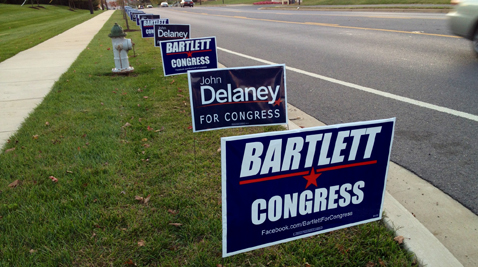WASHINGTON — Congressman-elect John Delaney won the support of a surprising number of Western Maryland voters on Election Day, but now those voters expect the Democrat to champion their causes more successfully than Rep. Roscoe Bartlett.
Delaney campaigned by saying he was determined not to “balkanize the district” — splitting it into subgroups that could be targeted with tailored messages. That strategy appears to have paid off. Though the scant polling of the matchup showed Bartlett and Delaney tied throughout the fall, Delaney’s 20-point win revealed the Democrat had more bipartisan appeal than any of Bartlett’s past challengers.
“I think having a candidate who offers a robust candidacy really resonated in the more rural portions of the district,” said Cumberland Democratic Mayor Brian Grim, who campaigned with Delaney in Allegany County. “(Voters) were willing to opt out of a guy they had known for 20 years.”
Pundits had expected Delaney’s margin in Montgomery County to render the rest of the district superfluous. To make the 6th District competitive, Gov. Martin O’Malley and Democrats in Annapolis moved more Democratic areas of Montgomery County into the district, while subtracting Republican areas of Baltimore, Carroll, Harford and northern Frederick counties — places Bartlett had consistently won by wide margins. Only Garrett, Allegany and Washington counties remain untouched in the new district.
Bartlett has blamed his loss on that redistricting process, but the numbers tell a different story. He lost Montgomery County 68 to 29 percent, but he also trailed in Frederick (58 to 38 percent) and Washington (48 to 47 percent) counties. Though he won 55 to 42 percent in Allegany County and 67 to 30 percent in Garrett County, the numbers represent a precipitous drop from his 2010 margins of 34 and 48 points, respectively.
Even if Montgomery County were subtracted from the district, Delaney still would narrowly win — though the race would have been much closer in Bartlett’s old district.
A CNS analysis of Delaney’s campaign showed the 49-year-old financier scheduled most of his appearances across the northern and western parts of the 6th District, while he specifically targeted Montgomery County with his grassroots and get-out-the-vote efforts.
“From the beginning, John made campaigning across the entire district a priority, that’s why we made over 100 campaign stops in Western Maryland,” campaign manager Justin Schall said.
As anticipated, Delaney’s 56,000-vote margin in Montgomery padded his districtwide 58-to-38-percent win over Bartlett. With Republican voters in northern Frederick County excised from the district, Delaney won the remaining half by about 10,000 votes.
Delaney advanced farther into traditionally Republican territory than previous Democratic challengers; he eked out a 600-vote win in Washington County, aided by a 61 to 34 percent victory in Hagerstown. He received little help from President Barack Obama, who lost Washington County 40 to 58 percent — worse than his 2008 showing.
“John won the Western Maryland portion of the district for the same reason he won in Montgomery County, because his private sector background, real-world experience creating jobs, and commitment to working with both sides to get things done resonates everywhere,” Schall said.
Throughout his 10 successful House races, Bartlett never lost Washington County. While he carried Allegany and Garrett counties, Delaney captured Cumberland by about 3 points.
But before Bartlett, the district was reliably Democratic. Bartlett in 1992 ended Democrats’ 21-year-long control of the 6th District. Then-Rep. Beverly Byron, a conservative Democrat, lost a primary challenge to Delegate Thomas Hattery of Frederick County, who then went on to lose to Bartlett, 54 to 46 percent. Bartlett had unsuccessfully challenged Byron in 1982.
Tim Magrath, a Frostburg State University professor of political science, said Bartlett held his seat for 20 years because of a lack of credible Democratic opposition.
“There’s a certain level of frustration here,” Magrath said. “I think people in the business community … frankly got tired of not having an effective representative.”
Magrath, who for seven years worked for former Democratic Sen. Paul Sarbanes in Western Maryland, said his region has consistently relied on Sens. Ben Cardin and Barbara Mikulski — and not Bartlett — to secure federal funding.
“I would have a hard time putting my finger on any project that did not have the signature of the two senators of Maryland,” Magrath said. “There has never, ever been by the congressman an effort to bring these resources to our community.”
Magrath also criticized Bartlett for not engaging his constituents, describing past meetings with the congressman as “more of a monologue where you’re sitting and listening to him.” Bartlett’s poor performance in Washington County, he said, revealed him as a weak incumbent.
“I think there was fatigue of the incumbent,” Magrath said.
Both Grim and Magrath said the opportunity to elect a new congressman may have persuaded voters in rural Appalachia to support Delaney, and that his presence in Western Maryland — whether on the airwaves or in person — legitimized his candidacy.
“The fact that he has spent time here and sat down with local leaders — that certainly gave us some reason to be excited,” Grim said.
By rejecting Bartlett’s bid for an 11th term, voters in the 6th District also severed their connection to the House Republican leadership. Democrats appear on track to pick up seven seats, but remain in the minority there.
Instead of Bartlett’s seniority, Grim said Delaney’s experience in commercial lending will make him more adept at bringing new investments to the region.
“I believe that his Rolodex will be advantageous to fulfilling promises and expectations set in Western Maryland.”

